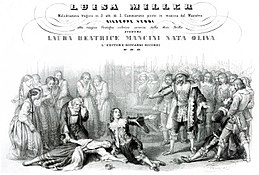Luisa Miller
| Luisa Miller | |
|---|---|
| Opera by Giuseppe Verdi | |

The death of Luisa from the first edition vocal score
|
|
| Librettist | Salvadore Cammarano |
| Language | Italian |
| Based on |
Kabale und Liebe (Intrigue and Love) by Friedrich von Schiller |
| Premiere | 8 December 1849 Teatro San Carlo, Naples |
Luisa Miller is an opera in three acts by Giuseppe Verdi to an Italian libretto by Salvadore Cammarano, based on the play Kabale und Liebe (Intrigue and Love) by the German dramatist Friedrich von Schiller.
Verdi's initial idea for a new opera – for which he had a contract going back over several years – was rejected by the Teatro San Carlo in Naples. He attempted to negotiate his way out of this obligation and, when that failed, Cammarano came up with the idea of adapting the Schiller play, with which Verdi was familiar. The process was set in motion, with Verdi still living and working on initial ideas from Paris, where he had been living for almost two years before moving back to his home town of Busseto in the summer of 1849. It was from there that he wrote the music and traveled to Naples for rehearsals. The first performance was given on 8 December 1849.
This was Verdi's 15th opera and it is regarded as the beginning of the composer's "middle period".
In August 1848, Verdi had written to the Naples opera house cancelling his contract of three years previous, in which he had agreed to write an opera for them. However, the management held him to it by threatening his librettist for failing to provide a libretto, and Verdi relented, encouraging Cammarano to develop "a brief drama with plenty of interest, action and above all feeling - which would make it easier to set to music"
In Verdi's mind, he had the perfect subject, to be based on the novel L'assedio di Firenze ("The Siege of Florence") by Francesco Domenico Guerrazzi, which glorified the life of the 16th Century Florentine soldier Francesco Ferruccio. This new subject was also a patriotic piece: Verdi had taken to heart the admonitions of the poet Giuseppe Giusti, who had pleaded with him after Macbeth and after Milan's political turmoil of March 1848 and its aftermath to "do what you can to nourish the [sorrow of the Italian people], to strengthen it, and direct it to its goal".
...
Wikipedia
